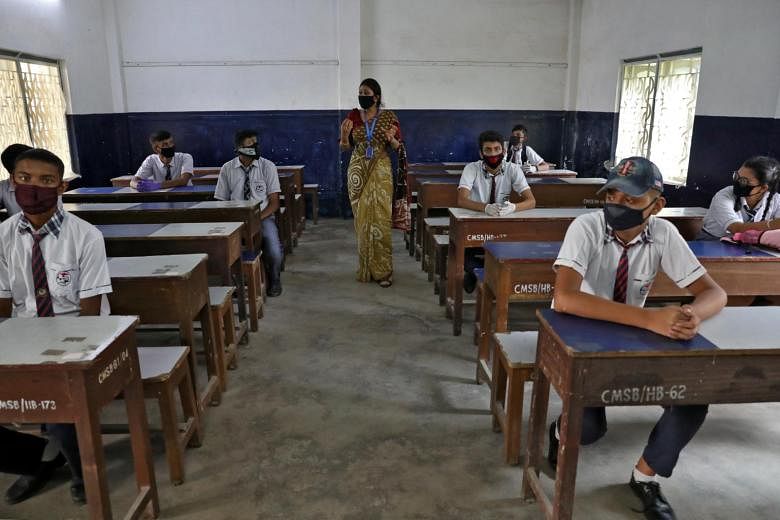NEW DELHI - A government proposal to reopen schools in India has generated opposition from many quarters, including parents and school management concerned that such a move could expose children to coronavirus infections.
Educational institutes were shut in March and have been asked to remain closed until Aug 31. Recent media reports suggested that the federal government could allow a gradual reopening of schools beginning next month in the new "unlock" guidelines that are expected at the end of August.
Safety measures proposed include a reduced presence of students and staff on campuses as well as shorter school hours.
This comes at a time when Covid-19 cases in India have surged past 2.4 million with unprecedented daily spikes. More than 47,000 have died, the fourth-highest tally in the world.
Certain countries like Israel and the United States have seen a worrying outbreak of coronavirus infections among children following the reopening of schools.
Mr Ashok Agarwal, the national president of the All India Parents Association, told The Straits Times that this is not the right time to reopen schools, considering the ongoing increase in coronavirus infections and a lack of public discipline in following directives such as physical distancing and wearing of masks. "This year should be declared a zero academic year and all students promoted to their next grades," he said.
Results of a survey released on Aug 11 by LocalCircles, a community-based social media platform, found that only 33 per cent of respondents supported the idea of reopening schools from September.
The conclusion was drawn from over 25,000 responses from parents and grandparents across India.
Concerns listed include the threat posed to children and to the elderly should a child in the family get infected, as well as their lack of confidence in the ability of schools to enforce physical distancing.
Data from Unicef also shows that only 53 per cent of schools in India have a facility for students to wash their hands with water and soap.
Even school administrators think the move to reopen schools will not draw support. "I don't think schools will reopen this year. Even if they do, parents and guardians will not send not their wards to schools given that coronavirus cases are still growing and are yet to reach their peak," said Mr Sanjeevan Bose, the principal of Divine Public School in Gorakhpur in Uttar Pradesh. "In such a situation, no parent will want to risk their child's life," he told ST.
However, the adverse impact on children from poor and marginalised families who have been unable to study online worries many education activists. Nearly 90 per cent of Indian households do not have a computer, according to the latest available government data, from July 2017 to June 2018.
And while smartphones have widened access to the Internet, less than half of the country's population - 500 million - is estimated to have such a device. Access to high-speed Internet also remains patchy in many parts of the country.
"We expect as many as 20 to 25 per cent children to drop out of schools if they remain closed any longer," said Mr Ambarish Rai, the national convener of the Right to Education Forum. This would lead to rising incidents of child labour and trafficking, he added.
Mr Rai suggested that instead of a sweeping federal plan asking schools to reopen, local authorities, including village councils, should be allowed to make that decision following a thorough local assessment of the threat posed by Covid-19.
The government, he said, meanwhile could focus on enhancing offline learning initiatives to ensure children do not drop out of schools.
Besides using radio, television and even loudspeakers to impart lessons, many local volunteer groups are currently teaching children from their neighbourhood in smaller groups. "It important to activate and strengthen such groups. The idea is not to finish the curriculum but to keep children engaged and free from stress," Mr Rai added.












